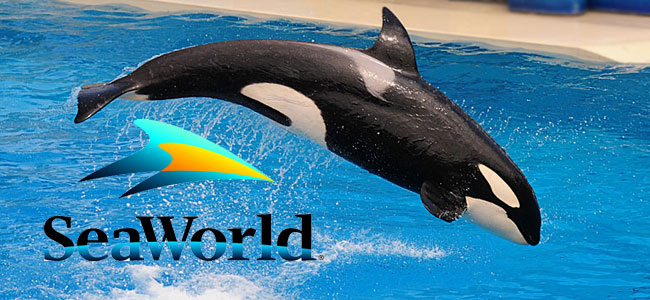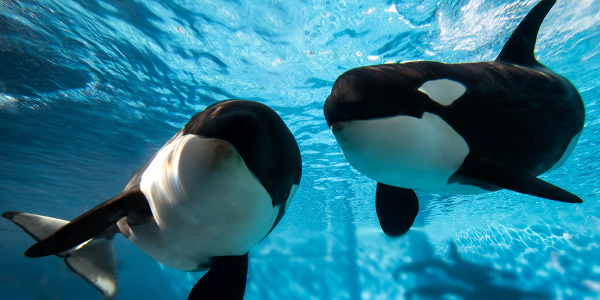To SeaWorld, Or Not To SeaWorld?
 Thursday, March 17, 2016 at 9:28PM
Thursday, March 17, 2016 at 9:28PM 
When I was younger, I was very fortunate to enjoy a few holidays in Orlando. And one of my favourite places to visit whilst there was SeaWorld.
I grew up with The Clyde & Seamore Show, spent hours watching the dolphins and penguins, and was amazed by the feats of Shamu and his kin. To this day, I have incredibly fond memories of SeaWorld.
Then along came Blackfish. And it brought to the surface thoughts and feelings that had probably already been there. Had I been young and naive and overlooked the inherent problems with SeaWorld?
We’re visiting Orlando again this year, and I’ve been meaning to write this blog for a while. With the announcement today that SeaWorld was ending its orca breeding programme, and the recent news that the track was complete on its newest ride Mako, it seemed like now was the perfect time for the big question:
Should we go to SeaWorld?
As I said, I always loved SeaWorld. But Blackfish and all the subsequent news stories, as well getting older and benefitting from a more critical mind, has made me re-think things.
I think that the park still has a lot to offer. Kirsty, who has always loved zoos and at one point was really excited about SeaWorld, now refuses to go. I just don’t know whether to go or not, and I want to hear what you think.
For me, SeaWorld has some fantastic rides, which I love. Journey to Atlantis, Kraken and Manta have all been highly enjoyable. And it’s got a brand new one this year, which looks awesome. Selfishly, I’d love to be one of the first people to ride it, and would hate to miss out.
I also always found SeaWorld incredibly educational. I learnt things I never would’ve known, saw animals I never would've seen, and was inspired by the work being done to save and protect a number of species. Genuinely, I always thought SeaWorld was one of the good guys.
But the world is smaller now. Kids growing up today can watch David Attenborough documents all day long. Do they need a park to educate them? Given the proliferation of information and technology, and shorter & shorter attention spans, I think we’d all benefit from having this kind of education and insight in front of us for a full day, whilst we are enjoying ourselves so that we’re more likely to take it in.
Did Blackfish say anything we didn’t already know, deep down? Some of its accusations were wrong, and have been proven so. Some though, were right. Like any documentary, it had an agenda and only really told one side of the story. (If you've watched Blackfish, you ought to also read SeaWorld's response, to get both sides of the story) But, it definitely hit a nerve and dramatically affected SeaWorld’s attendance figures, dropping by 84% between 2014 and 2015.
Inherent cruelty versus a necessary evil?
So what is bad about SeaWorld? Plain and simply, it has animals in captivity. And this is inherently wrong; locking up any kind of animal, big or small, in any kind of cage, big or small, is wrong. It’s against nature. And there’s no denying this.
But is there evidence of intentional cruelty, violent incidents, sadistic actions or forced neglect? I don’t think there is. SeaWorld hit back at these allegations, and Blackfish never really showed any concrete facts for their accusations.
The parks are heavily controlled by national and international regulations, and have regular visits from inspectors. They are always under both media and visitor scrutiny - surely we’d see more stories of actual cruelty if it was actually taking place?
There would also be more reports from all the staff and trainers who work there, the vast majority of whom clearly love their jobs. Why for example, are there some trainers who remain staunch defenders of SeaWorld and their work with whales, like the one in Blackfish who was pulled into the water on two separate occasions, and still works for the company?
The woman that was killed, and was the centre of the documentary is a case in point. Her family said on the record that she wouldn't have stayed at SeaWorld if she thought it was cruel. Her death was an accident.
But is it one that shouldn’t have happened? Whales aren’t meant to be kept in tanks. No animals are.
But is it, at present, a necessary evil?
If you watched Channel 4’s The Secret Life Of The Zoo, they explained on a number of occasions how yes, in an ideal world, there wouldn't be any need for zoos. But we don’t live in an ideal world. Zoos, aquariums and enclosures are necessary to save animals, protect species and look after the world.
The wild is a cruel place, and many animals wouldn’t survive. Words like torture should not be thrown around lightly at SeaWorld, because that just isn’t true. In the wild, with illegal poaching, hunting, pollution and development, wildlife is in great danger of real torture, real harm, and death.

Funding conservation or condoning captivity?
Maybe that’s one of the reasons why there is a case for going to SeaWorld. It does fund massive conservation efforts. It partners with hundreds of wildlife protection organisations and has saved the lives of around 27,000 animals. It has spent more than $10 million in recent years to look after marine life around the world.
It’s saved endangered species and turned opinions around. It’s largely responsible for the huge success story in the preservation of Manatees in Florida. Take a look at SeaWorld Cares for more information, and how the company answers any questions about its animals and operations. (Of course, this is in part a PR campaign to boost their reputation, so be wary).
SeaWorld is part of a corporate company. It does need to make a profit. And it’s this profit that is necessary to look after the animals effectively. If everyone stopped going, what would happen to them? Would they just be released into the wild and left to die?
But that’s not a reason to keep going to the parks, that would be blackmail.
Things do need to change.
That’s why this announcement is monumental.
The power of a documentary
Slowly, it looks like pressure has had an effect. SeaWorld has already said it will change the shows it puts on with orcas, shifting instead to a focus on natural orca environments and encounters, rather than theatrical performances for treats.
This next announcement that no new orcas will be bred in captivity is massive. It’s a big step in the right direction, a huge step in fact. It shows the power a documentary can have; influencing public opinion and making change possible.
Of course, there is more work to do. These whales still need bigger places to live. They might not be able to survive in the wild, but they could live in wild-like coastal enclosures where they can roam the seas to an extent. And all the focus has been on orca whales - but what about the other whales and dolphins?
One step at a time. For a company to give up what was once its bread and butter, to listen to campaigners and to the general public, well it should be - not necessarily rewarded - but praised. This is a big step.
Is it reason to visit SeaWorld?
It could be that now we go with a critical eye. When you’re a child, or you have children with you, it’s easy to get swept up in all the excitement and enjoyment of a theme park. With a more mature head on my shoulders, and images from Blackfish flashing in my head, I’d like to go back and look more closely at the operations, to see any evidence for myself.
Arguably, there’s also a historic reason to go. It’s the last chance to see things as they were - before they change for the better, hopefully. And surely it’s better to have a seat at the table to influence change, rather than complaining from the outside?
In some respects, it’s not really about what has happened previously. It’s in the past, and whatever the intentions at the time, now, they are different. Twenty years ago, thoughts, opinions and knowledge were not what they are now. Science and understanding has advanced. What matters now is how SeaWorld deals with the future.
As the CEO Joel Manby said, its SeaWorld that ‘helped to inspire the changing attitudes that, in turn, inspired our company's changing policies.’
So, the big question. Should or shouldn’t we go to SeaWorld? I’ve laid out my thoughts, what do you think?
Reader Comments